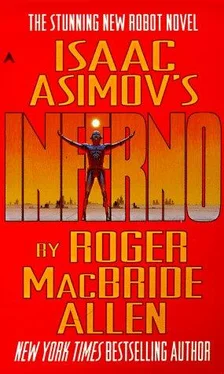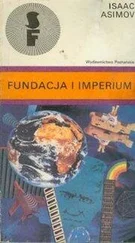Isaac Asimov - Inferno
Здесь есть возможность читать онлайн «Isaac Asimov - Inferno» весь текст электронной книги совершенно бесплатно (целиком полную версию без сокращений). В некоторых случаях можно слушать аудио, скачать через торрент в формате fb2 и присутствует краткое содержание. Год выпуска: 1994, ISBN: 1994, Издательство: Ace Books, Жанр: Фантастика и фэнтези, на английском языке. Описание произведения, (предисловие) а так же отзывы посетителей доступны на портале библиотеки ЛибКат.
- Название:Inferno
- Автор:
- Издательство:Ace Books
- Жанр:
- Год:1994
- ISBN:ISBN: 044-100514-4
- Рейтинг книги:4 / 5. Голосов: 1
-
Избранное:Добавить в избранное
- Отзывы:
-
Ваша оценка:
- 80
- 1
- 2
- 3
- 4
- 5
Inferno: краткое содержание, описание и аннотация
Предлагаем к чтению аннотацию, описание, краткое содержание или предисловие (зависит от того, что написал сам автор книги «Inferno»). Если вы не нашли необходимую информацию о книге — напишите в комментариях, мы постараемся отыскать её.
Inferno — читать онлайн бесплатно полную книгу (весь текст) целиком
Ниже представлен текст книги, разбитый по страницам. Система сохранения места последней прочитанной страницы, позволяет с удобством читать онлайн бесплатно книгу «Inferno», без необходимости каждый раз заново искать на чём Вы остановились. Поставьте закладку, и сможете в любой момент перейти на страницу, на которой закончили чтение.
Интервал:
Закладка:
Isaac Asimov, Roger MacBride Allen
Inferno
For Isaac
Acknowledgments
I wish to thank the many people who helped this book come into being. Thanks to my editor, David Harris, for catching gaffes, large and small, in the first draft, and generally keeping me honest. Thanks to John Betancourt, and Leigh Grossman of Byron Preiss Visual Publications for keeping me as informed as possible about the state of play—and to Byron Preiss for making me diliver. Thanks to Susan Allison, Laura Anne Gilman, and Ginjer Buchanan at Ace Books, for much appreciated advice and encouragement, and a vast supply of undeserved patience. Thanks to Eleanore Fox, who put up with a great deal of typing on the premises when I should have been helping her explore London. Thanks to my parents, Tom and Scottie Allen, who have always provided me with both familial and editorial support.
But needless to say, thanks most of all to Isaac Asimov, to whom this book is dedicated. It would require a volume longer than this one to tell all of what we owe him. Suffice to say that, without him, there would be no Three Laws, no robots, no Spacers or Settlers—and no Inferno.
We will miss him.
Roger MacBride Allen
The original laws of robotics
I. A robot May Not Injure a Human Being, or, Through Inaction, Allow a Human Being to Come to Harm.
II. A Robot Must Obey the Orders Given It by Human Beings Except Where Such Orders Would Conflict with the First Law.
III. A Robot Must Protect Its Own Existence As Long as Such Protection Does Not Conflict with the First or Second Law
The new laws of robotics
I. A Robot May Not Injure a Human Being.
II. A Robot Must Cooperate with Human Beings Except Where Such Cooperation Would Conflict with the First Law.
III. A Robot Must Protect Its Own Existence, As Long As Such Protection Does Not Conflict with the First Law.
IV. A Robot May Do Anything It Likes, Except Where Such Action Would Violate the First, Second, or Third Laws.
THE SPACER-SETTLER STRUGGLE was at its beginning, and at its end, an ideological contest. Indeed, to take a page from primitive studies, it might more accurately be termed a theological battle, for both sides clung to their positions more out of faith, fear, and tradition rather than through any carefully reasoned marshaling of the facts.
Always, whether acknowledged or not, there was one issue at the center of every confrontation between the two sides: robots. One side regarded them as the ultimate good, while the other saw them as the ultimate evil.
Spacers were the descendants of men and women who had fled semi-mythical Earth, with their robots, when robots were banned there. Exiled from Earth, they traveled in crude starships on the first wave of colonization. With the aid of their robots, the Spacers terraformed fifty worlds and created a culture of great beauty and refinement, where all unpleasant tasks were left to the robots. Ultimately, virtually all work was left to the robots. Having colonized fifty planets, the Spacers called a halt, and set themselves no other task than enjoying the fruits of their robots’ labor.
The Settlers were the descendants of those who stayed behind on Earth. Their ancestors lived in great underground Cities, built to be safe from atomic attack. It is beyond doubt that this way of life induced a certain xenophobia into Settler culture. That xenophobia long survived the threat of atomic war, and came to be directed against the smug Spacers—and their robots.
It was fear that had caused Earth to cast out robots in the first place. Part of it was an irrational fear of metal monsters wandering the landscape. However, the people of Earth had more reasonable fears as well. They worried that robots would take jobs—and the means of making a living—from humans. Most seriously, they looked to what they saw as the indolence, the lethargy, and the decadence of Spacer society. The Settlers feared that robots would relieve humanity of its spirit, its will, its ambition, even as they relieved humanity of its burdens.
The Spacers, meanwhile, had grown disdainful of the people they perceived to be grubby underground dwellers. Spacers came to deny their common ancestry with the people who had cast them out. But so too did they lose their own ambition. Their technology, their culture, their worldview, all became static, if not stagnant. The Spacer ideal seemed to be a universe where nothing ever happened, where yesterday and tomorrow were like today, and the robots took care of all the unpleasant details.
The Settlers set out to colonize the galaxy in earnest, terraforming endless worlds, leapfrogging past the Spacer worlds and Spacer technology. The Settlers carried with them the traditional viewpoints of the home world. Every encounter with the Spacers seemed to confirm the Settlers’ reasons for distrusting robots. Fear and hatred of robots became one of the foundations of Settler policy and philosophy. Robot hatred, coupled with the rather arrogant Spacer style, did little to endear Spacer to Settler.
But still, sometimes, somehow, the two sides managed to cooperate, however great the friction and suspicion. People of goodwill on both sides attempted to cast aside fear and hatred to work together—with varying success.
It was on Inferno, one of the smallest, weakest, most fragile of the Spacer worlds, that Spacer and Settler made one of the boldest attempts to work together. The people of that world, who called themselves Infernals, found themselves facing two crises. All knew about their ecological difficulties, though few understood their severity. Settler experts in terraforming were called in to deal with that.
But it was the second crisis, the hidden crisis, that proved the greater danger. For, unbeknownst to themselves, the Infernals and the Settlers on that aptly named world were forced to face a remarkable change in the very nature of robots themselves…
Early History of Colonization, Sarhir Vadid, Baleyworld University Press, S. E. 1231
Prelude
THE ROBOT PROSPERO stepped out of the low dark building into the night. He approached the man in the pale grey uniform, the man who was standing well away from the light, near to the shore. Fiyle, the man’s name was.
Prospero moved with a careful, steady tread. He did not wish to make any sudden moves. It was plain to see that his contact was jumpy enough as it was.
The valise was heavy in Prospero’s hand, the small case packed solid. It seemed proper that it be heavy, with all the futures that were riding on this transaction. If anything, the case seemed rather light, if one considered all the freedom it would buy.
Prospero came up to the man and stopped a meter or two from him.
“That the money?” Fiyle asked, the nasal twanginess of his voice betraying his off-world origins.
“It is,” Prospero said.
“Let’s have it, then,” Fiyle said. He took the case, set it down on the ground, and opened it. He pulled a handlight from his pocket, switched it on, and directed the light down onto the bag.
“You don’t trust me,” Prospero said. It was not a question.
“No reason why I should,” Fiyle said. “You’d be willing and able to lie and cheat if you had to, wouldn’t you?”
“Yes,” Prospero said. There was no point in denying something that everyone knew about the New Law robots. Robots that could lie. The idea seemed strange, even to Prospero.
But then, the idea of a criminal robot was a little strange as well. Fiyle offered the light to Prospero. “Here,” he said, “hold this for me.” Even here, now, it happened. Even this man, this Settler, deep inside the rustbacking trade, did not give a second thought to ordering a New Law robot around. Even he could not remember that New Law robots were not required to obey the commands of a human. Unless the man was merely manipulating him, playing games. If that was the case—
Читать дальшеИнтервал:
Закладка:
Похожие книги на «Inferno»
Представляем Вашему вниманию похожие книги на «Inferno» списком для выбора. Мы отобрали схожую по названию и смыслу литературу в надежде предоставить читателям больше вариантов отыскать новые, интересные, ещё непрочитанные произведения.
Обсуждение, отзывы о книге «Inferno» и просто собственные мнения читателей. Оставьте ваши комментарии, напишите, что Вы думаете о произведении, его смысле или главных героях. Укажите что конкретно понравилось, а что нет, и почему Вы так считаете.








